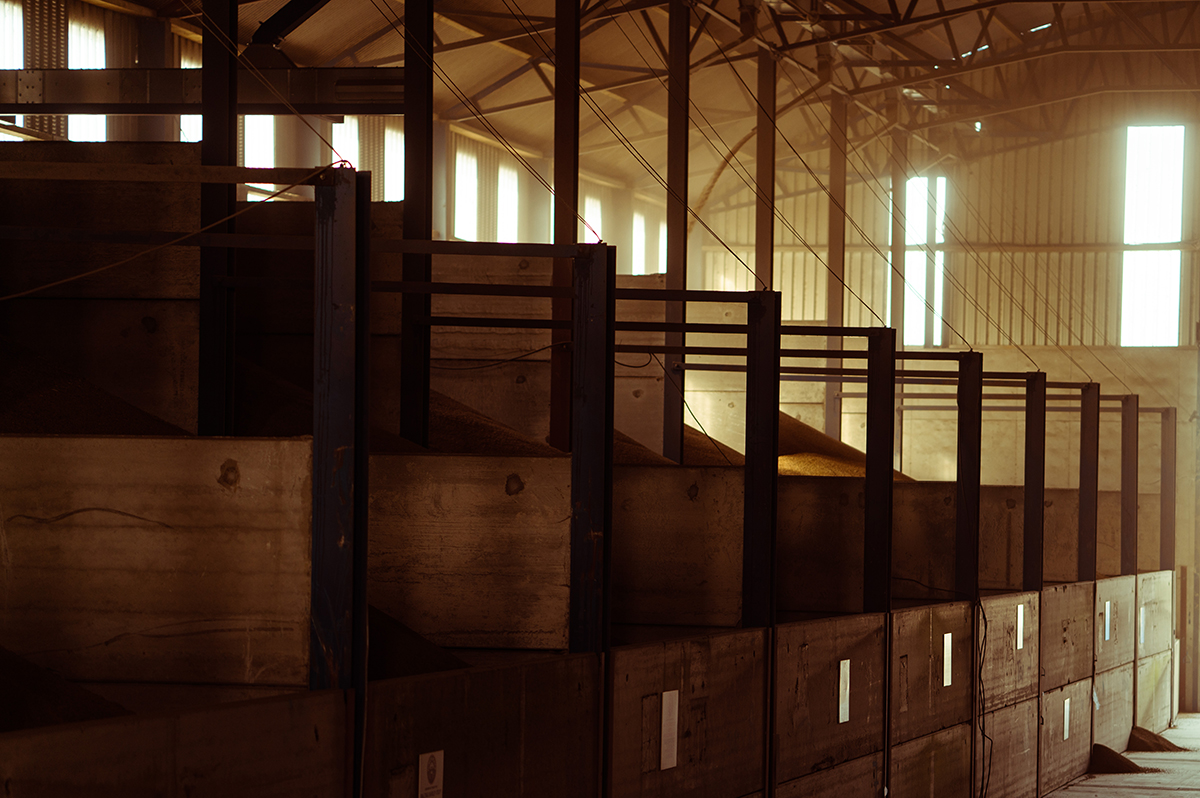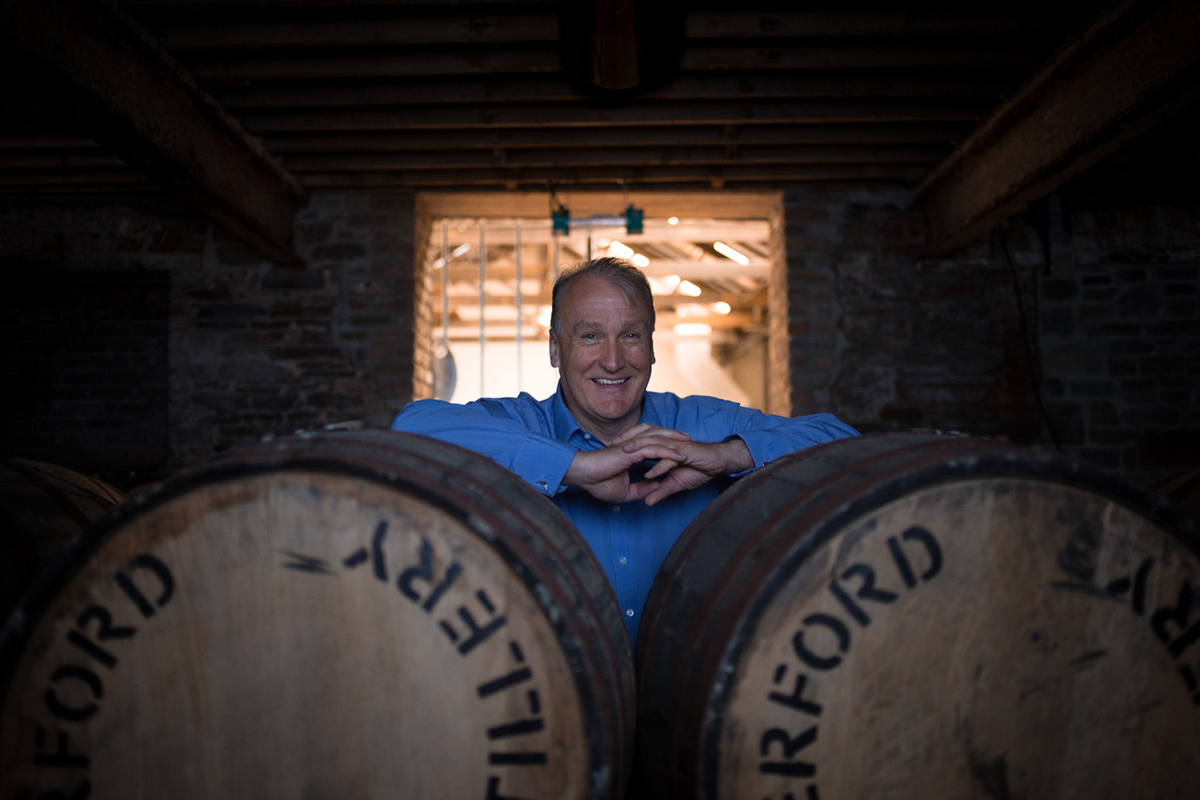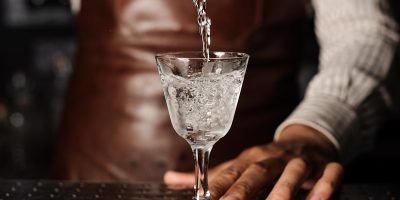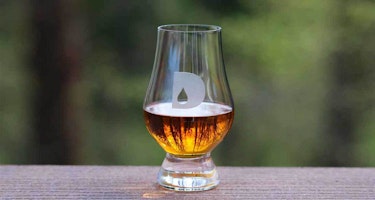Ireland’s Waterford Distillery is embarking on one of the biggest terroir explorations in the history of the whisky industry. Involving dozens of farms, as well as biodynamic and heritage barley, it is as ambitious of a project as they come.
But to truly understand this grand experiment, one just has to look at its founder, Mark Reynier. While in the wine trade for the first half of his career, Reynier was overcome by the notion of terroir—the subtle character influenced by microclimate and soil. Later, he introduced the terroir concept to the whisky industry while at Bruichladdich Distillery during its renaissance years.
His latest project, Waterford Distillery, is located in a converted former Guinness brewery in the southeast of Ireland. Founded just four years ago, Reynier calls it his facilitator. Waterford is a far cry from the old and rather romantic operation at Bruichladdich—but it more than serves its purpose. Its objective is to create the world’s most profound single malt whisky. Reynier intends to reach that lofty goal by fully embracing the concept of terroir.

The Cathedral of Barley at the Waterford Distillery / Photo Credit: Waterford Distillery
BARLEY PROVENANCE
The prevailing belief in the whisky industry is that wood makes the whisky. Maturation in oak barrels is often attributed with providing 70 percent or more of a whisky’s flavor. It’s a statement that bothers Reynier to no end. “That old chestnut,” says Reynier. “It is absolute nonsense and needs to be nailed once and for all.”
At Waterford the provenance of the barley is key. The distillery works with 72 Irish farms, all located in the same region as the distillery. In total the barley is grown in 19 different soil types. Notably, everything is meticulously documented in a digital logistical system. Each farmer’s crop is harvested, malted, fermented and finally distilled separately. Effectively, this creates 40 different new-make spirits each season.
Some of the Waterford farms practice biodynamics, which can be seen “as a turbocharged version of organic farming”, says Reynier. In fact, some of the best wines he has ever tasted were biodynamically produced. As a result, he set out to convince a few of the farmers to adopt the concept. Last year Waterford finally distilled its first batch of biodynamic spirit.
HERITAGE GRAINS
Another way of exploring terroir is by producing spirit from heritage grains. These grains, most of which fell out of favor many decades ago, have a lower yield than modern varieties. Reynier calls it a journey to explore which flavors were available in the past. There are plans to eventually distill grain that hasn’t been used in brewing and distillation for over a 100 years.
“The barley grown on each farm will have an individuality, a terroir, whose expression we hope to be able to extract using our facilitator distillery”, explains Reynier. “When eventually creating a vatting, you stack the identity of all those farms. You are adding layers of complexity, one on top of the other, like a mille-feuille gâteaux.”
A simple organoleptic assessment of the various Waterford new-make spirits shows how much diversity there is from farm to farm. But Reynier knows that’s far from sufficient evidence to convince terroir skeptics. Whereas the wine industry is widely accepting of terroir, it still is a controversial subject in whisky.

Waterford Distillery CEO Mark Reynier / Photo Credit: Waterford Distillery
THE SEARCH FOR THE PROOF
Reynier needs extensive peer reviewed research to prove his point, which is where the Whisky Terroir Project comes into the picture. It’s a joint venture with Enterprise Ireland; Dr. Kieran Kilcawley of Teagasc; Dr. Dustin Herb of Oregon State University; Minch Malt; and independent whisky analysts Tatlock & Thomson. “Right now doubters can always say, ‘Ah, but there is no scientific evidence.’ That has led me to set up my own project,” says Reynier.
The initial results of the research are promising. The long and short of it, says Reynier, is that terroir in whisky exists. But before they publish, which should be around Christmas of this year, they want to make sure that there’s no stone left unturned. However, even if the proof is definitive, Reynier has no illusions that the research will bring about much change.
“You can bet your bottom dollar that after we publish the word terroir is going the be used and abused by all the big players like there is no tomorrow,” says Reynier. “Stand by as they try and nail their colors to this idea. It will be a fig leaf. That would be using a term that’s easily made to be confusing and has a lot of kudos attached to it, without actually having to do anything.”
THE ULTIMATE TEST: TASTE
Intricate research aside, the proof in the pudding will be convincing whisky drinkers.Waterford Distillery will release its first official whiskies in pairs next year. As a result, drinkers will be able to compare and contrast whiskies from different farms. Two will arrive in the spring and two in the autumn. Each of the four are single farm whiskies made from the same barley and cask composition. They will be of a similar age.
“That will be a prelude to the main bottling, the grand cuvée, which will be an assembly of any of those forty different farms,” says Reynier. “In ten years we’ll be able to not just do 40 whiskies from one year, but to use older vintages as well. The permutations will become extraordinary. Nobody has ever done this.”
Plan to visit the Waterford Distillery?
With Distiller, you’ll always know what’s in the bottle before you spend a cent. Rate, Review, and Discover spirits. Head on over to Distiller, or download the app for iOS and Android today!
Want to enjoy Distiller ad-free plus exclusive discounts, giveaways, features and other perks? Join Distiller Pro today to support the Distiller platform and keep ads off of your screen.



